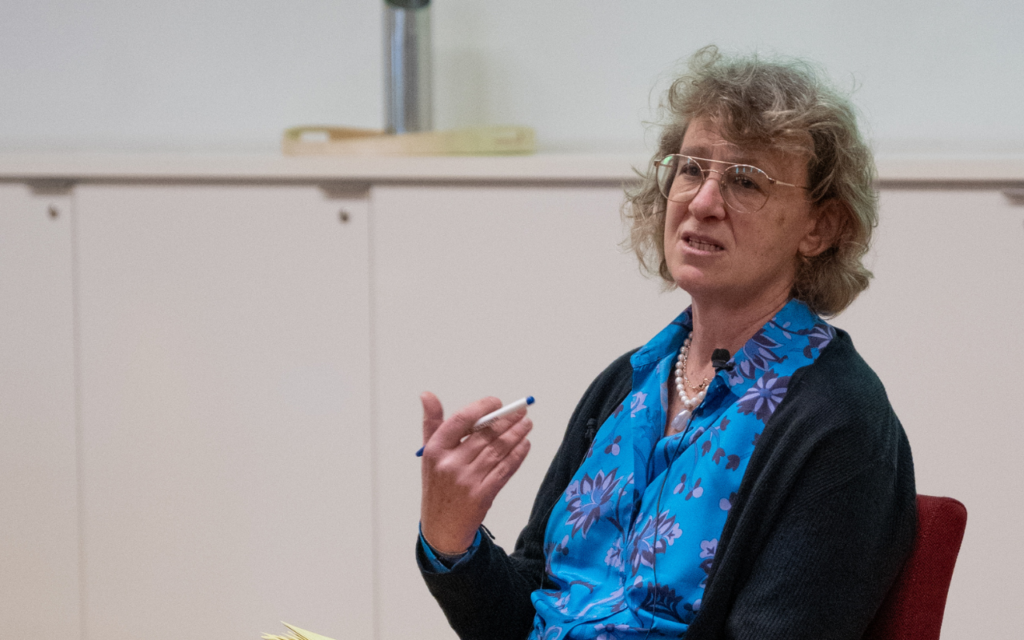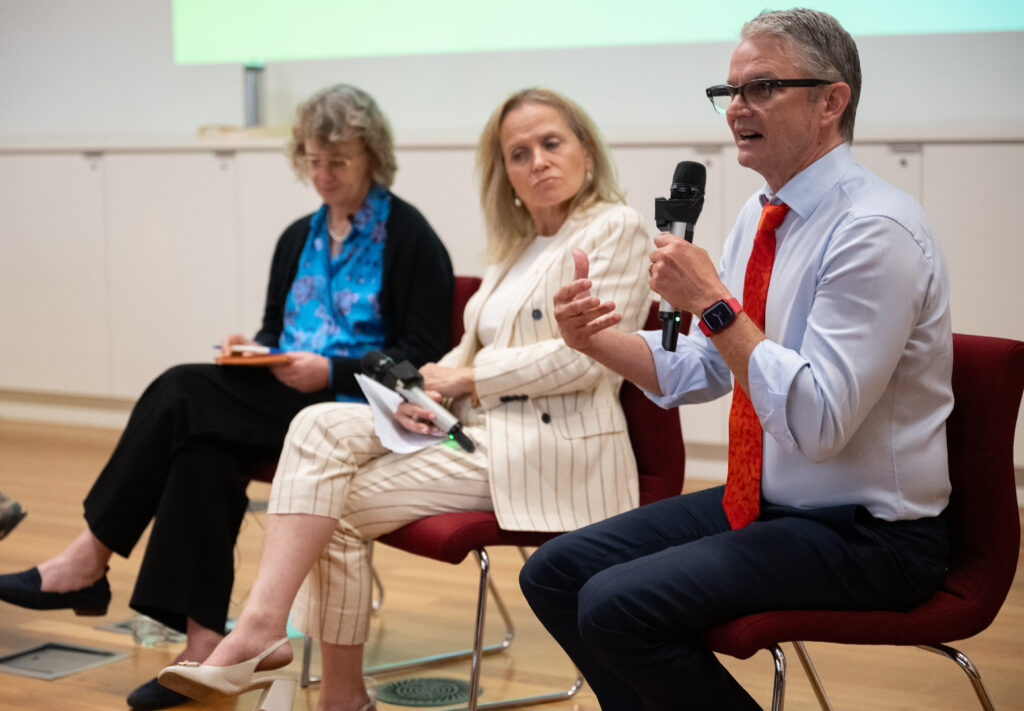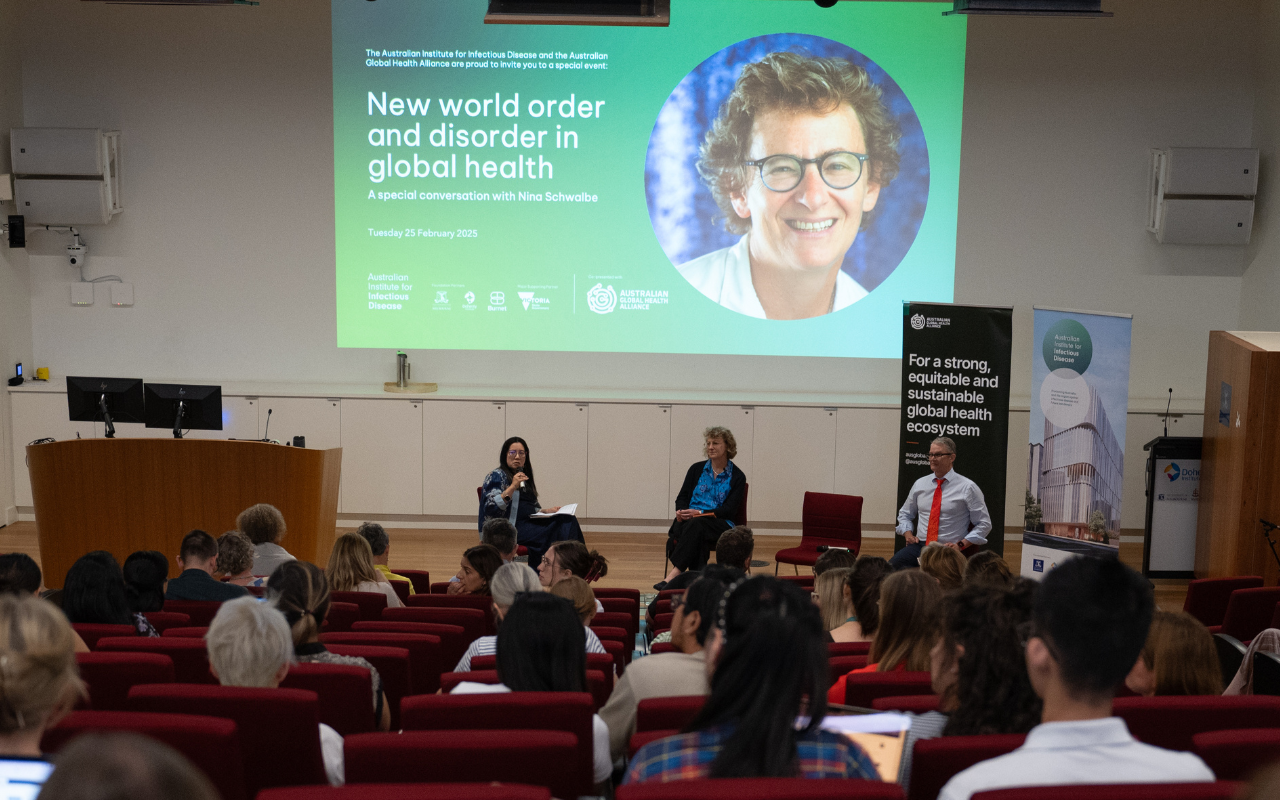One of the world’s foremost global health policy thought leaders, Nina Schwalbe, has urged Australians to join the fight against the withdrawal of United States funding for global health aid.
Ms Schwalbe was speaking at the Australian Global Health Alliance (AGHA) and Australian Institute for Infectious Disease (AIID) event, entitled New world order and disorder in global health.
Contributing to the discussion was the Director of the Burnet Institute, Professor Brendan Crabb AC and Director of the Peter Doherty Institute for Infection and Immunity Professor Sharon Lewin with AGHA Executive Director Dr Selina Namchee Lo moderating.
Ms Schwalbe gave a concerning insight into the reality of global health. Since Donald Trump took over as US president in January, there have been significant global aid cuts.
“I don’t know if many of you saw the image of Elon Musk with a chainsaw, and he’s just cut the head off global health,” Ms Schwalbe told the audience.
“Recognise that we’re at war in the US … We really have two years to turn the legislature around, so we’re in a very tight time.”
When misinformation is being spread, she urged the audience to get back to grassroots advocacy.
“You’re all leaders in your communities … Everyone has to speak with their communities. I think that’s how we will rebuild trust,” she said.

HIV programs in jeopardy
Some of the first programs on the chopping block were the US withdrawal from the World Health Organization and the freeze of USAID programs.
“The funding has stopped. The tap has literally turned off. And many staff have been fired, so there’s nobody to call when grantees wanted to submit waivers … There’s literally nobody in the building and there’s a lot of confusion about these orders,” Ms Schwalbe said.
One of the major programs affected is the President’s Emergency Plan for AIDS Relief (PEPFAR), which received a stop work order in late January. There have been a few waivers related to HIV medicines, treatment and care programs, including prevention of mother-to-child transmission.
The shutdown has seen worldwide ripple effects: “The South African MRC (Medical Research Council), 38% of their money comes from the US government. We’ve heard stories of Uganda health workers laid off,” she said.
In addition, there are fears about the Global Fund, an organisation founded in 2000 to provide HIV, AIDS and malaria treatment for people in low and middle income countries.
“The US is a major donor to that fund, and they pledged $6 billion over three years to that fund. They’ve only given $2 billion. They haven’t actually cut the cheque yet (for the rest). That is also a serious threat,” Ms Schwalbe said.

A domino effect: surveillance and clinical trials under threat
The panel spoke about how the reduction of global health spending will impact surveillance of illnesses such as flu, measles and COVID-19.
“If the US doesn’t participate in the collaborative global flu surveillance and creation of new flu vaccines, that will also hurt American people, because our flu vaccines will be less effective,” Ms Schwalbe highlighted.
“It’s potentially compromised our whole surveillance system for something as common as flu, let alone a new disease of what we went through with COVID,” Professor Lewin agreed.
Professor Lewin also highlighted the impact that the dismantling of diversity, equity and inclusion policies will have on clinical trials around the world. In February, the US Food and Drug Administration removed its draft guidance to drug and device makers to increase diverse populations for late-stage clinical trials from its website (although on 11 February 2025, a court order forced them to reinstate it).
“Many of us involved in these international trials are being asked to review our diversity strategy and I’m thinking ‘no, we just can’t do this’. We can’t participate. In these big studies that are being set up, there are studies out of the US, out of the UK, out of Singapore. We should participate in the studies that meet our values. That’s something that we, as a global community, need to be saying,” Professor Lewin said.
“It’s so important to have diverse participants in a clinical trial, simply because we need to know what those treatments do to all different people, whether you’re old or young or male or female or transgender. This is absolutely critical.
“The idea we’re going to cut out the commitment to diversity in clinical trials is completely against science,” she continued.
Re-imagining global health for a new era
The consensus from the panel was that this period gives us an opportunity to re-conceptualise global health. But what does that look like?
According to Professor Crabb, we need to understand how we can transform global health for the new era.
“One thing that’s come through the pandemic is regionalisation. It’s not just about inter-country cooperation, you want that to be very strong. But we need some self-sufficiency at a regional level,” he said.
He said it’s also a time to re-establish the way we think about global health.
“We need to decolonise our approach to global health. From a rich country, poor countries and intermediate countries, a sense of equivalence, of allyship, of cooperation, of power sharing. How can we really make that transition?” he asked.
Ms Schwalbe agreed that this needs to change in all arenas, from studying global health to working in it.
“I think we really need to reform the curriculum and how we teach public health. I think in the US, it is still too colonial in its approach. I think we have to do more on how people work locally and how they expand that work to engage with global partners,” she said.
More funding is needed, but with many countries cutting aid budgets, it’s unlikely that funding will come from a single source.
According to Professor Crabb, there needs to be a two-pronged attack. Firstly, all governments need to do more, even those who receive the benefits themselves.
“The first message to governments is that the benefits are great. We greatly underspend in this, whether you’ve got the US or not. If you want a world that has a future, it’s the catalytic nature of what happens through aid that’s going to give you that future,” he said.
Secondly, the global health community needs to think creatively and come up with non-government approaches.
“There’s a lot of money out there in the world. Very little of it sees the need to come this way. The onus is on us to tell a much more powerful story,” Professor Crabb said.
Australians urged to share those stories and take action
Gag orders make it difficult for US organisations to speak out. Ms Schwalbe asked Australians to help speak on behalf of the global health community.
“We are looking for other organisations that received USAID or US government or CDC support to speak out, go on the record and help us with our court cases,” she said.
She also asked for people to speak out at conferences and share what they think with the community.
“I think if this community could write op-eds about what this means and why you think it’s wrong,” she suggested.
With the Australian Federal election looming, she urged the community to talk about the importance of equity.
“Australia has been so strong on equity. You’ve been strong on gender in the global arena. You’ve been so strong on HIV, both through your national example of how you dealt with it,” she said.
Ms Schwalbe pleaded for better aid, more aid and help for the global fund.
“The Global Fund needs support, and Australia has been a big supporter, and we really need that voice,” she said.
Subscribe to the free InSight+ weekly newsletter here. It is available to all readers, not just registered medical practitioners.

 more_vert
more_vert